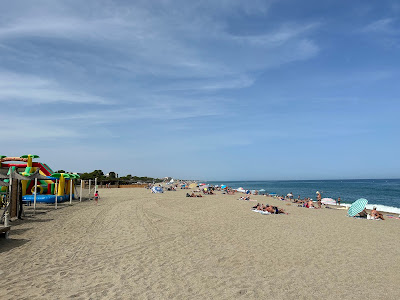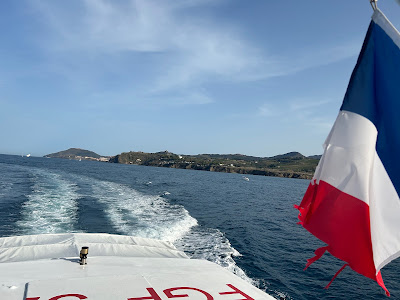Fail to plan, they say, and plan to fail.
I’m sure there’s some truth in that. As there is in most aphorisms. Not all of them of course. I have no idea who came up with that bright little drop of optimism that ‘good things come to those who wait’, but he must have been living in a different universe from mine.
Still, even if planning is generally a good thing, it’s often the unplanned that gives the greatest pleasure.
While we were in southwestern France last weekend, we decided to pop down to the beach at Argelès-sur-Mer. That was less of a visit than a pilgrimage. The beach is spectacular, but we live near the Spanish Mediterranean coast and probably wouldn’t travel to France just for sand and sea. No, this beach isn’t just golden and sunlit, it’s associated with something much darker and shameful.
 |
| The beach at Argelès, showing no sign of its shameful past |
When I say ‘nothing’, I really mean nothing. There were no latrines. There was no shelter. There was no reliable supply of fresh water. Every now and then someone would turn up and toss some food at the internees. It was pretty vile. Hunger and disease-ridden, as I’m sure you can imagine.
Deaths were nothing like as horrific as they might have been had the internment lasted longer, but fortunately with the outbreak of the next war, the world war, within months of the Spanish defeat, many were recruited into the French armed forces, while others were able to move on to friends or family ready to take them in, or into charitable accommodation, above all that provided by Quakers. Even so, several hundred died.
So, we visited the beach to see what the place looked like. There’s no trace of the camp anymore but still, it felt like a small act of deserved respect to visit the place where this shameful act took place.
But then we had the whole of the afternoon ahead of us. What to do next?
We saw signposts to a coastal path that zigzagged along the top of the sea cliffs, towards the lovely fishing village of Collioure, a few kilometres further on. I say ‘fishing village’ though what it really is now is a major tourist destination with some pretty wonderful accommodation for the pretty wonderfully rich. We went there once before, but by car, and found it was impossible to park anywhere inside the town, it was so seething with visitors. In the end, we had to park outside the town and walk half an hour to get to the seafront.
To be fair, though, it’s such a fine place that it was worth it. Indeed, walking in was probably an enhancement to the visit, since it gave us time to see the place from various angles as we approached it, which is a much better way to get to know somewhere than shooting in by car.
Anyway, this time we had no intention of walking all the way to Collioure. It was only a little over four kilometres away, but it was hot, the terrain was rough, and there was a lot of climbing. We decided we wouldn’t go the whole way.
So, naturally, we did.
 |
| Approaching Collioure the hard way, by the cliff path |
There were signs to the tourist office. But at 4:00 on a Sunday afternoon? No chance it was open.
And yet it was.
“Is there a bus to take us back to Argelès?” we asked.
“Ah, I’m afraid,” the friendly woman behind the counter told us, glancing at her watch, “that by now the last bus will have gone.”
“Oh,” we said, trying not to sound too disappointed.
“But there is a boat,” she went on, “and the next one leaves in twenty minutes, from the pier just outside this office.”
Joy. Elation. Relief, too.
 |
| Collioure Castle in the background, with our boat in front It may not seem much, but it felt like luxury |
 |
| Leaving Collioure, the easy way, by boat |
Of course, the good thing didn’t come to us as we waited for it. On the contrary, we had struggle to it along difficult paths through oppressive heat.
Further convincing me that whoever said that about good things coming to those who wait, certainly didn’t belong to the universe I inhabit.
2 comments:
Thanks for a bit of history.
San
A bit more, right? I don't seem to be able to write anything much these days without including a historial angle...
Post a Comment